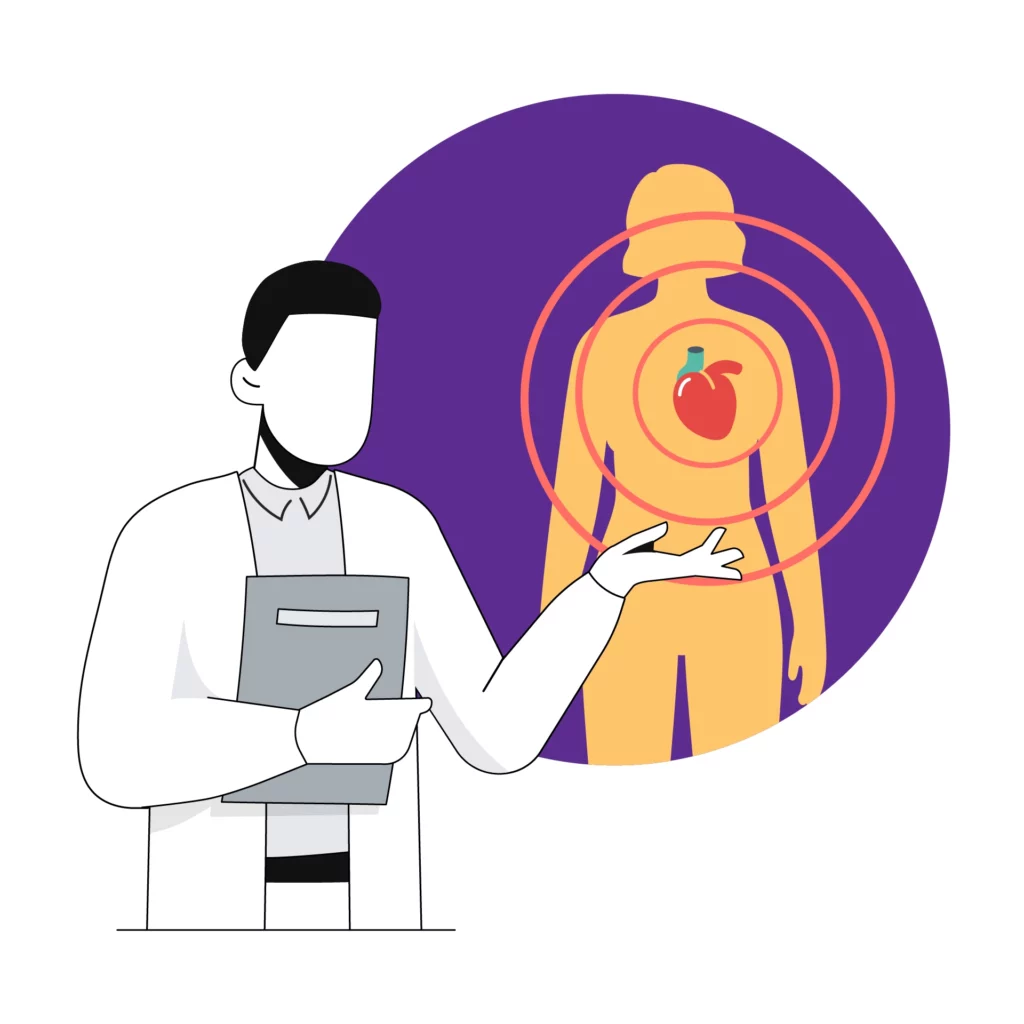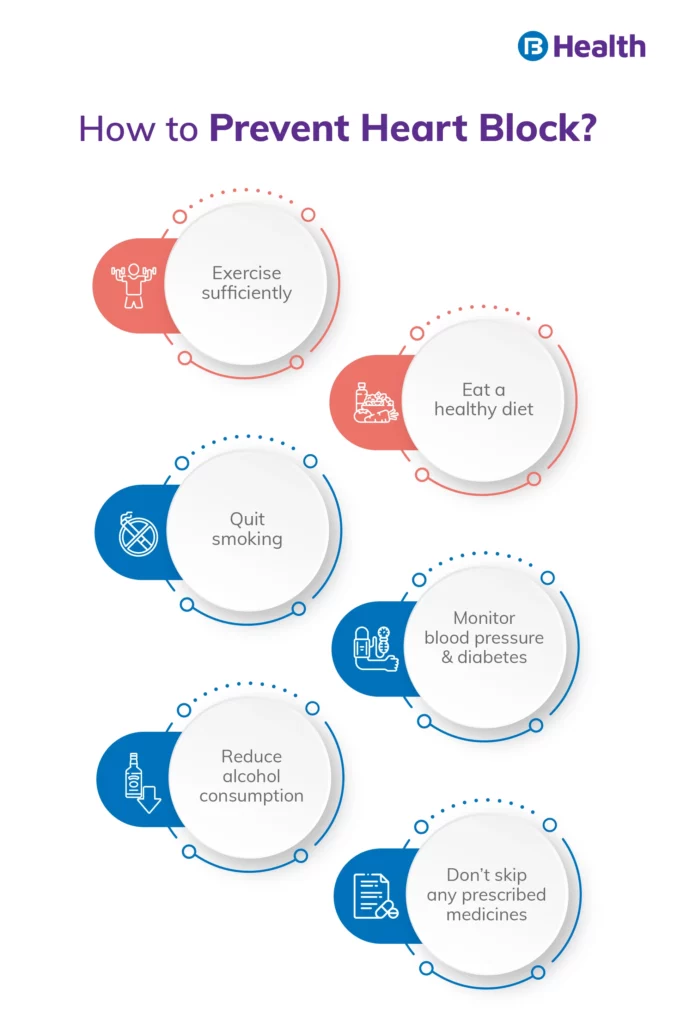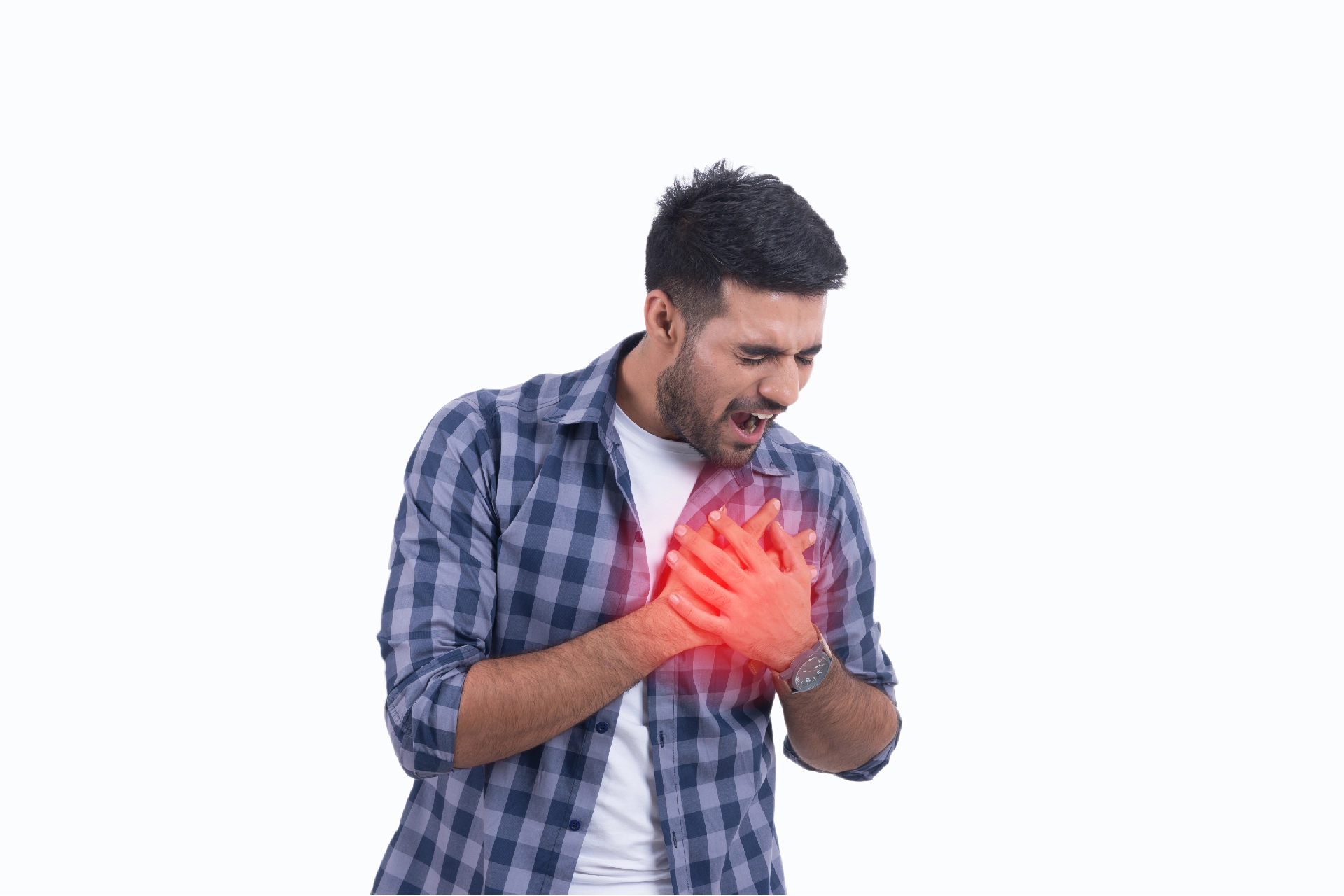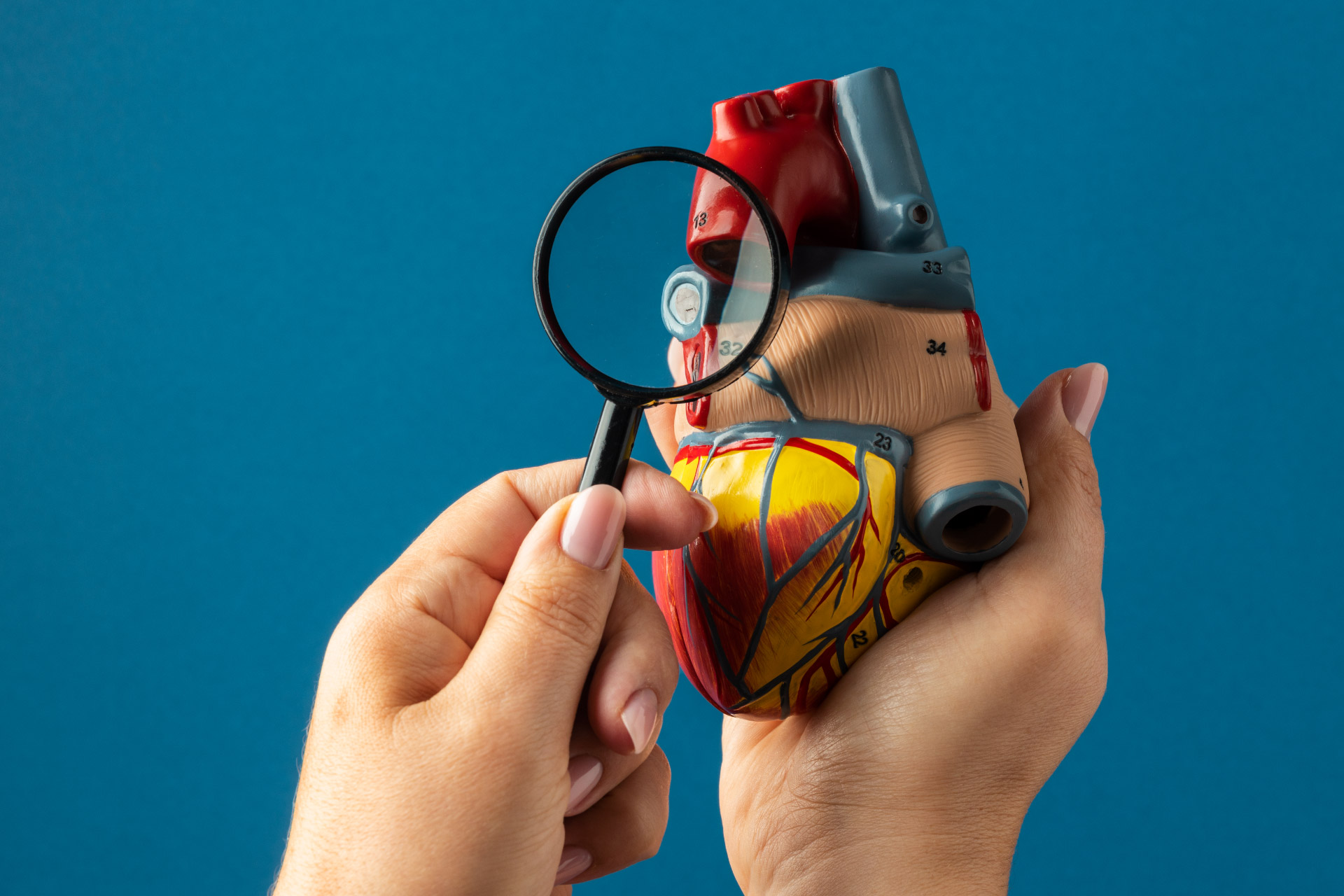Heart Health | 7 min read
Heart Block: Meaning, Types, Early Signs and Treatments
Medically reviewed by
Table of Content
Synopsis
A heart block makes your heart beat slowly or incorrectly pump blood. It may show symptoms or no signs at all. Check out the types, causes, symptoms, and risk factors associated with a heart block in this blog.
Key Takeaways
- A heart block happens because of issues with the electric signalling of the heart
- Various causes of heart block can be congenital or acquired
- Knowledge about the symptoms and causes of heart blocks is essential to get the right diagnosis and treatment
During its lifelong functioning, the heart may be subjected to various ailments and conditions that affect its ability to work properly. A heart block is one such major ailment of the heart. It occurs when your heartbeat's controlling electrical signal gets blocked partially or completely.
Your heart is a vital body organ that is part of the human circulatory system. It is the chief organ responsible for pumping blood all through the body in a process called circulation. Blood vessels also assist the heart in circulating blood in the body as part of the cardiovascular system.
The diagnosis of a heart blockage can be worrying. However, with the right information, treatment, and support, diagnosis and treatment may proceed in the right direction.
Heart Block Meaning
It is a major heart ailment when there are issues with your heart's electrical system. This slows down your heartbeat or may even skip beats, resulting in insufficient blood pumping by the heart. This condition is also called AV block, an Atrioventricular block, or conduction disorder.
The heart has a specialized cell system that generates electrical impulses to understand it better. They then distribute these signals throughout your heart at specific speeds.
Normally, electrical signals travel from the heart's upper chambers or atria to its lower chambers or ventricles. The Atrioventricular node, or the AV node, is a cell cluster connecting the electrical activity from the heart's top chambers to the bottom chambers.
Whenever a block occurs, the electrical signal is not able to pass on properly through the AV node to the ventricles. It results in a heart that beats at a reduced rate or skips beats. Simply put, it means that the heart doesn't function as a normal heart would.
There are three types: first-degree, second-degree, and third-degree [1].
What Causes Heart Block?
Heart block may occur for several reasons, some existing by birth and others developing in the heart over time. However, the most common cause is a heart attack. Here are the various heart blockage causes that you need to know.
Congenital
A congenital heart block occurs by birth, and a person is born with it. It may happen due to the mother's condition during her pregnancy, or the child may be born with this ailment.
Cardiomyopathy
Cardiomyopathy is a heart muscle disease that may be acquired or inherited as hereditary. This condition makes it difficult for the heart to deliver blood to the body, eventually leading to heart failure.
Heart Valve Diseases
The heart valve is also subjected to diseases. Aging-induced changes in the heart valve structure, heart valve infection, congenital disability, heart attack, and coronary artery disease can cause these heart valve diseases. They lead to improper functioning of the heart.
Damage to the heart
Damage to the heart also causes heart block. This damage can be caused by open heart surgery, medication side effects, or exposure to toxins.
Damage to heart wires
As we grow older, a heart block may develop when the wires that connect the top and bottom of the heart fail due to the development of fibrosis. Any cause which damages these heart wires can result in a heart block. High potassium levels or other electrolyte abnormalities can also result in wire failure.
Other heart diseases
Coronary artery disease, heart attacks, sarcoidosis, certain cancers, or any heart inflammation disease such as certain autoimmune diseases or infections are also heart block causes.
What Are the Early Signs of Heart Blockage?
Heart blocks are difficult to identify as their symptoms can be confused with those of various other diseases. The following are the early signs of blockage in the heart:- Dizziness or Lightheadedness
- Fatigue
- Fluttering or pounding in the chest
- Palpitations
- Shortness of breath
- Chest pressure or pain
- Difficulty in doing exercise
It is always better and advisable to take care of your heart health from a young age. Though serious anomalies can happen without warning, you can always choose brisk walking, running, jogging, or light exercise to keep your heart strong. Even yoga for the heart provides several proven benefits to improve your heart health. These should be accompanied by a heart healthy diet, less in fats to keep you healthy.
Heart Blockage Symptoms
The general symptoms of heart block depend on the type of blockage in the heart. However, if you notice any of these symptoms, you should never ignore them. You can take up an immediate online doctor consultation or visit the nearest health center or hospital to book an appointment with a cardiologist.
Following are the signs of blockage in the heart:
First-degree heart block symptoms
- There may be no symptoms
- A routine ECG (electrocardiograph) confirms it even when the heart rate and heart rhythm are normal
The above types are common in teenagers, athletes, young adults, and those with a highly active vagus nerve.
Second-degree heart block symptoms
- Feeling dizzy
- Fainting
- Chest pain
- Shortness of breath
- Feeling tired
- Nausea
- Heart palpitations
- Rapid breathing
Third-degree heart block symptoms
- Chest pain
- Fainting
- Dizziness
- Feeling tired
- Shortness of breath
When a heart block becomes third-degree, it becomes intense, and the heart rate slows considerably.
If you find any of these symptoms, it is always recommended to seek medical attention immediately.
Additional Read: How to Make Heart Strong
Diagnosis
You must first book an appointment with a cardiologist or take an online doctor consultation for an opinion. Your cardiologist will look into your medical history and family health history. In addition, they will ask questions related to your diet, overall health, symptoms, and activity level. You also need to provide info about any medications you may be taking.
Then, your cardiologist will conduct your physical exam. First, they will listen to and check your heartbeat. Testing for any fluid build-up or swelling in your feet, legs, and ankles will also be done.
The cardiologist may refer you to an electrophysiologist based on the physical exam results. They are specialists in the electrical activity of the heart. They might ask you to go through some tests.
ECG
ECG or an electrocardiogram records your heart's electrical activity. It shows electrical signals' rhythm and timing as they move through your heart. This test determines how severe the heart block is.
Implantable loop recorder
This is a very slender device in the form of a loop that can be implanted under the patient's chest skin. It monitors the heart rhythm. This is done for patients with infrequent episodes that need a clear explanation.
Electrophysiology study
In this study, the physician will insert a long, thin tube via a blood vessel into your heart. The aim is to record and measure electrical activity from inside your heart.

How is Heart Block Treated?
Once a heart block is identified and diagnosed, the right heart blockage treatment has to be taken care of. However, treatment can only start when a heart block is symptomatic, i.e., causing visible symptoms. This happens in cases of second-degree heart block and third-degree heart block. First-degree or initial-stage heart block may not show any or minor symptoms sometimes.
Symptomatic heart block can be serious, and the patient needs to be treated immediately at the hospital for the right heart blockage.The type of treatment preferred will depend on the nature and severity of the heart block. Your doctor will recommend various tests, including the electrophysiology study, to check your heart health and functioning. The results of these tests will decide the course of action for the treatment.
Medications
Depending upon the condition of the heart block, your doctor will prescribe certain anti-arrhythmic drugs. They can change the electrical signals in the heart and regulate rapid heart rhythms.
TCP or transcutaneous pacing
TCP or transcutaneous pacing is the suggested treatment for heart blockages that show symptoms. It can restore your normal heartbeat by putting pads on your chest. The pads deliver electrical pulses to your heart that correct your heartbeat.
TCP can be uncomfortable, so the person is sedated before it begins. Once the heartbeat becomes stabilized, a pacemaker may be inserted permanently.
Pacemaker
A pacemaker is a small electrical device similar to a battery that is used to correct your heart rate. It is inserted into one of your veins before planting it next to your heart. The wires on the pacemaker are inserted into your heart. They generate a series of pulses regularly to keep your heart beating.
Additional Read: Types of Heart DiseasesComplications With Heart Block
Heart blocks may come with some life-threatening complications, such as:
- Heart failure
- Heart attack
- Sudden cardiac arrest
- Arrhythmia (irregular heartbeat) [2]
Heart block is a serious heart ailment and should not be treated carelessly. Correct diagnosis and treatment are only possible if you visit the cardiologist immediately upon encountering any heart blockage symptoms.
In addition, as we observe World Heart Day every year to spread the message of heart health awareness, there is a need to keep your heart in good shape through regular exercise and a healthy diet.
Contact Bajaj Finserv Health to book an appointment with a cardiologist for guidance.
References
- https://www.nhsinform.scot/illnesses-and-conditions/heart-and-blood-vessels/conditions/heart-block
- https://www.medicalnewstoday.com/articles/180986
Disclaimer
Please note that this article is solely meant for informational purposes and Bajaj Finserv Health Limited (“BFHL”) does not shoulder any responsibility of the views/advice/information expressed/given by the writer/reviewer/originator. This article should not be considered as a substitute for any medical advice, diagnosis or treatment. Always consult with your trusted physician/qualified healthcare professional to evaluate your medical condition. The above article has been reviewed by a qualified doctor and BFHL is not responsible for any damages for any information or services provided by any third party.





